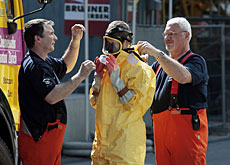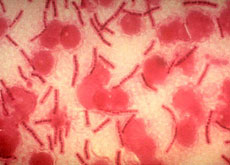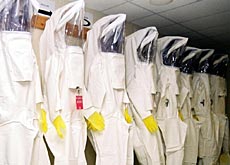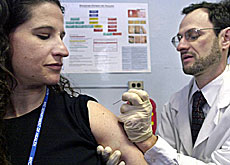Swiss push to tighten bioterrorism plans

Since 2001 Switzerland has made progress in protecting its civilians against possible bioterrorism strikes, but coordination must be improved say experts.
This echoes a recent warning by the European Commission about the dangers of possible biological attacks and calls for member states to step up cooperation as the first step to possible EU-wide policy.
The likelihood that terrorists would use smallpox, anthrax, botulism or Ebola-style viruses to launch strikes against Switzerland remains very small according to security experts.
“But the impact could be immense, so you need to be prepared,” Patrick Mathys, deputy head of the Early Warning and Epidemiology Section at the Federal Health Office, told swissinfo.
In 2001 Switzerland was confronted for the first time with the threat of bioterrorism. Unknown perpetrators sent around 1,000 fake anthrax letters, inspired by the attacks in the United States in which five people died after being exposed to the bacteria.
Several hundred Swiss post offices and Zurich airport came to a standstill as a result of the scares.
A 2004 report by Zurich’s Federal Institute of Technology about the Swiss anthrax alerts and the subsequent crisis management revealed failures involving communication, allocation of responsibilities, and preparedness.
Closing gaps
“Since 2001 quite a lot has changed,” said Marc Cadisch, director of the Spiez Laboratory, Switzerland’s main NBC (Nuclear, Biological and Chemical) research centre.
“Six regional laboratories have been set up by the cantons to be able to safely analyse samples.”
The Spiez laboratory is also building a centre to safely analyse all germs, including the most dangerous such as Ebola.
The Commission for NBC Protection was also asked to elaborate a nationwide strategy, the first draft of which was presented to the government in June.
“But one of the biggest outstanding issues is to improve cooperation between the state and the cantons and making sure the cantons have the same levels of preparedness,” warned Sergio Bonin, author of the International Biodefence Handbook.
Another issue is that there are several federal emergency taskforce groups where responsibilities aren’t clearly defined.
EU cooperation
But even the best-laid plans have their weaknesses. “You can never be prepared enough to deal with a bioterrorism attack; you have to re-evaluate your plans all the time as your counterparts’ strategies change,” explained Mathys.
“The preparation levels of the cantons are really different and the possibilities of the federal state are limited – but you can’t change the federal structure.”
And working with the EU is not straightforward for non-member Switzerland either.
“Much more needs to be done; we do our best to get in touch with our EU counterparts but as a non-member you are not really invited to cooperate,” said Mathys.
“There are alert and information systems at EU levels which we want to join but so far it hasn’t been possible as a non-member state. That’s the price we have to pay.”
Sizeable problem?
Bonin describes Switzerland’s overall bioterrorism preparedness as “on the right track”, but if there were a smallpox attack, the whole world would be affected.
“We are not quite where we want to be, but that’s not a specific Swiss problem,” said the Zurich researcher. “Look at the United States which has been spending billions of dollars since September 11; they have lots of plans but not much experience or trained people – that’s the next stage.”
Bonin says that it is much the same in Switzerland; if you ask the average Swiss physician, they don’t know much about bioterrorism or how to recognise related diseases.
“The thing is how far do you want to go?” he points out. “Bioterrorism is a high consequence but low probability event. At the moment there’s a big debate about how big a problem bioterrorism really is.”
swissinfo, Simon Bradley
A week after September 11, Switzerland created the “B” Commission which comprises cantonal experts, the Swiss army, the Spiez Laboratory and the Federal Health Office.
Its mandate is to identify, examine and communicate information on the dangers of bioterrorism.
Commission B operates on the basis of five bioterrorism scenarios: anthrax, smallpox, plagues, botulism and tularaemia.
In 2004, the Commission for NBC Protection was asked to draw up a comprehensive concept for national NBC protection.
The operational duties of the NBC Commission are due to be transferred to a newly established NBC Office of the federal state and the cantons. In addition, the NBC Office will take over coordinative duties between the federal state and the cantons.

In compliance with the JTI standards
More: SWI swissinfo.ch certified by the Journalism Trust Initiative




You can find an overview of ongoing debates with our journalists here. Please join us!
If you want to start a conversation about a topic raised in this article or want to report factual errors, email us at english@swissinfo.ch.